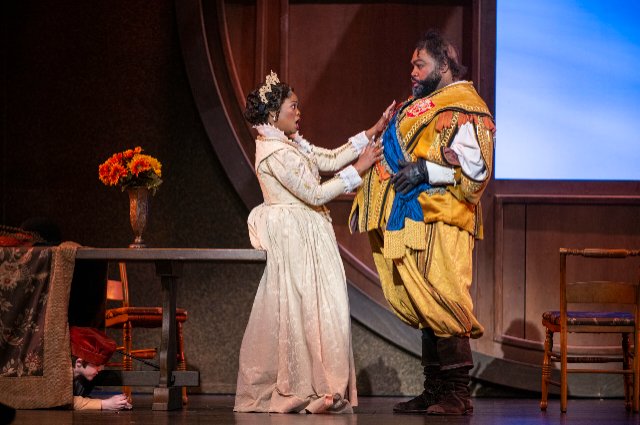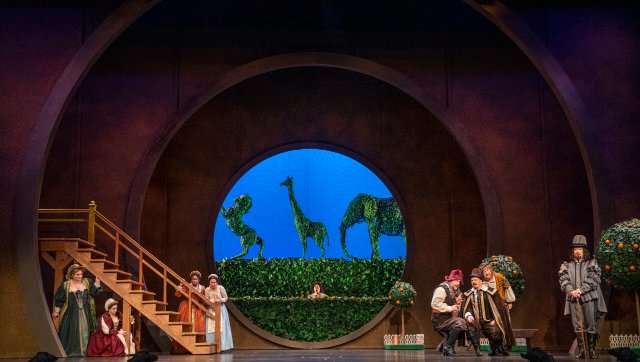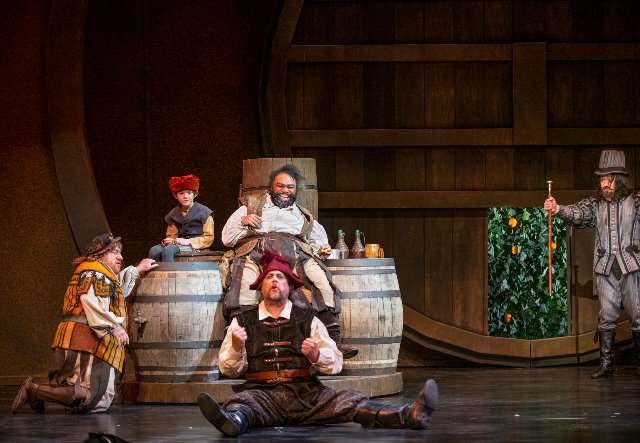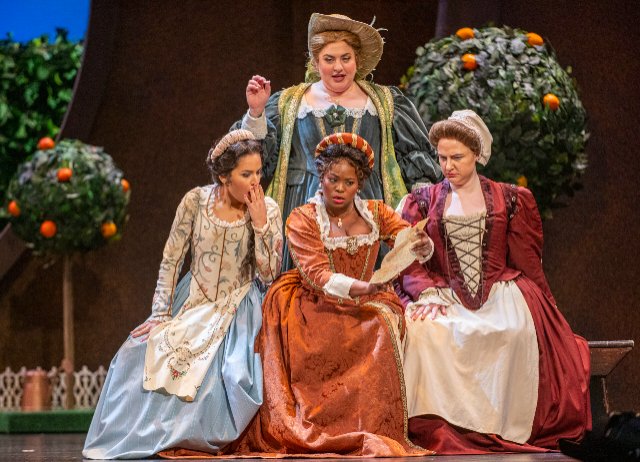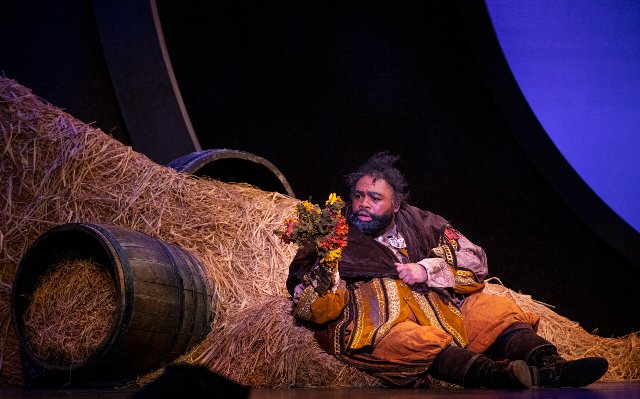Falstaff
A Great Production of Verdi's Exquisite Comic Opera
By: Victor Cordell - Feb 12, 2023
Verdi admired Shakespeare. “Macbeth” was among the composer’s great early works. Four decades later, he would return to The Bard’s folio for his final two operas. Verdi’s penultimate opera, “Otello,” was perhaps his crowning achievement, with many cognoscenti arguing that the opera improves upon the play. After toiling seven more years, the composer premiered “Falstaff,” based on the character introduced in Henry IV Parts 1 and 2, and fleshed out in “The Merry Wives of Windsor.” For the librettos of both of these final operas, the composer turned to Arrigo Boito, who perhaps deserves as much credit as Verdi for the greatness of these works.
“Otello” abounds with darkness and tragic intrigue, while “Falstaff" offers spirited roguishness and light intrigue. This would be Verdi’s only attempt at comedy other than the failed early work “Un Giorno de Regno.” Unlike “Otello,” which is rich with notable arias, “Falstaff” seems to eschew memorable tunes in its through-sung, largely conversational format. Lacking set pieces that would appear on “Best Hits” albums, “Falstaff” instead treats the listener to endless anticipation and variety. In its highly inventive score, Verdi’s lifetime of musical mastery comes through. The mix of texture and rhythm are pronounced, especially in ensemble pieces.
Frothy delights like “Falstaff” present particular challenges. Comic timing, enthusiastic affect, and vocal versatility must be heightened. Opera San José’s production excels in every dimension. Performers sing with joy and act with charm. All of the artistic elements strike the right note, resulting in a production that glitters.
As the focus of his comedy, Verdi set his sights on the larger-than-life character Sir John Falstaff. Licentious and self-indulgent, he is one of literature’s notable comic characters. He may be viewed as a chauvinist whose confidence to seduce women exceeds his desirability as a love interest, and he’s certainly willing to use whatever deception to entrap the opposite sex. But his self-delusion will become apparent as his scheming leads to humiliation. Indeed, Shakespeare and Verdi may be viewed as feminists in the context of this work as the women win the contests by outfoxing the conniving men.
In the central plot line, Falstaff sends love letters to two married women, Alice Ford and Meg Page. Although he fancies himself an appealing lover, his motivation is financial – to blackmail the women after having assignations with them. Unknown to the perpetrator, his quarries are friends, and learning of the deception, they are able to turn the tables on Falstaff. In a secondary plot, Alice’s husband, John Ford, has arranged for their daughter Nannetta to marry the established and older Dr. Caius, but she loves the callow Fenton. The story develops a little slowly, having incidents that introduce characters without adding to the central narratives. But the story picks up steam and is always aided by the energy of the music as well as the fine performances and production values of this offering.
The lively music is punctuated by animated ensemble pieces including the complex a capella patter quartet by the women in which they vow revenge against Falstaff. Another highlight is the double quartet plus one, in which the four men commit to foil the young lovers Fenton and Nannetta, while the women show support for them, and the lovers pledge their love above the cacophony of their elders. These clever ensembles are sung with remarkable zest and skill.
The score also includes aria-length soliloquys. Particularly touching is Ford’s wonderful reflection about his love for Alice. As previously noted, Verdi does not yield to recurring melodic phrases which mark the beloved arias of his middle period. While this may disappoint some, “Falstaff” is a masterpiece in its own right.
Opera San José’s casting is superb. Of course, the sine qua non for success with this opera is a compelling title character, and Darren Lekeith Drone transcends requirements in every way. His full baritone voice with warm vibrato suits the role well. Moreover, he nails the portrayal with a full range of visual and vocal expression. In his flouncy corpulence, Drone commands the stage, displaying pompousness and narcissism with everything from mugging to mock and genuine ire. His exuberance and smiling visage make him sympathetic enough to ultimately allow forgiveness in the end for his bad behavior.
Falstaff’s nemesis, Alice Ford, provides a counterbalance. Played brilliantly by Chanáe Curtis, Mistress Ford possesses enterprise and quick wit to defeat him. Curtis exudes charm and a full range lyric soprano with considerable power in the mid and upper portions. Every other cast member contributes well to the happy outcome. It is a little unfair to mention one individual without mentioning them all, but Natalia Santaliz, with a sweet soprano voice, as the young lover Nannetta is a favorite.
Joseph Marcheso conducts the orchestra with complete authority. The sound is always rich and bright and the pace is brisk. Marcheso navigates the dynamics and staccato elements with particular skill. Director José Maria Condemi deserves special commendation for orchestrating the onstage chaos, with striking movement and positioning. The laundry scene, in which the women have Falstaff hide in a clothes basket only to get dumped into the river is particularly raucous. Steven C. Kemp’s scenic design also deserves a nod. He uses a single and appropriate basic set in a reddish wood color that is built around the visual theme of wine kegs and openings framed by the head hoops of barrels. Additionally, kudos to Howard Tsvi Kaplan for costumes, Christina Martin for wigs and makeup, and David Lee Cuthbert for lighting.
“Falstaff” stands as a great achievement in the exquisite catalog of Giuseppe Verdi, as well as that of librettist Arrigo Boito. It is a work that will satisfy the greatest opera afficionados yet is accessible to newcomers to the genre as a great comedy supported by exhilarating music. Opera San José has shown again what an asset it is to the Bay Area’s cultural community.
“Falstaff” is composed by Giuseppe Verdi with libretto by Arrigo Boito, produced by Opera San José, and plays at California Theatre, 345 First Street, San Jose, CA through February 19, 2023.

